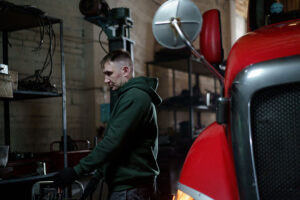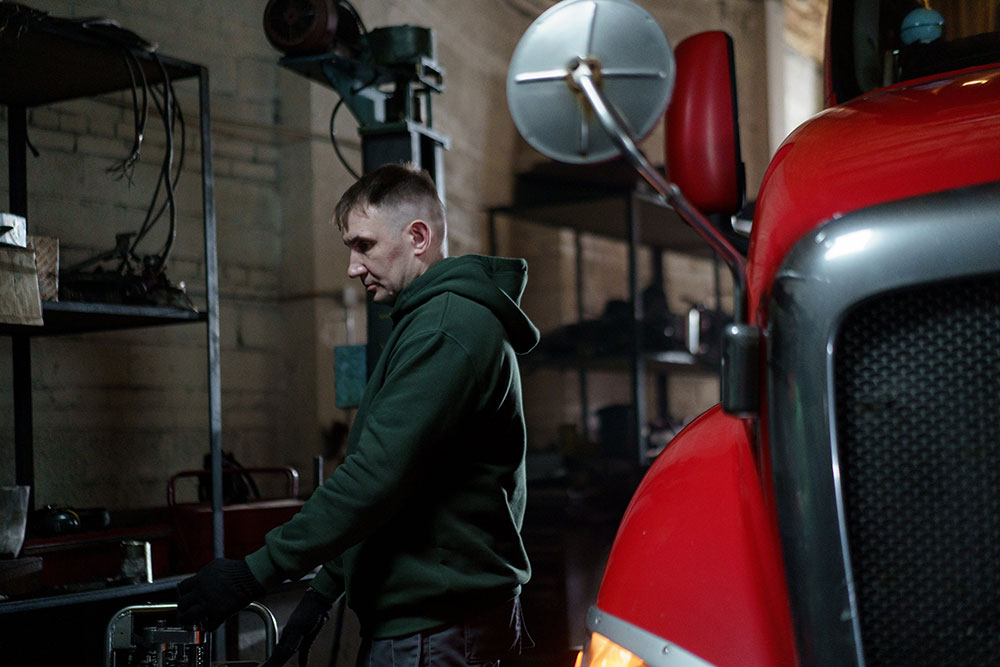Disclaimer: The information on our website is provided for general information purposes only. We make no representations or warranties of any kind, express or implied, about the completeness, accuracy, reliability, suitability or availability with respect to the website or the information contained on our website for any purpose. Any reliance on such information is therefore strictly at your own risk and we are not liable for any damages or losses arising out of or resulting from your reliance on any information contained on our website.
A diesel mechanic inspects, repairs, and overhauls any type of diesel engine. Additionally, they work on vehicle electrical systems and retrofit engines with emission control systems to comply with regulations. Watch a video to learn what a diesel mechanic does:
How to Become a Diesel Mechanic

To become a diesel mechanic, you typically need a high school diploma or equivalent. Employers may also favor those with trade certifications or vocational courses in automotive repair, electronics, and diesel engine repair. In fact, many community colleges and trade schools offer certificates or degree programs in diesel engine repair. These programs also incorporate classroom instruction with hands-on training. This includes basic diesel technology, practical exercises, and repair techniques. You would also learn how to interpret technical manuals and electronic diagnostic reports.
Diesel mechanics who begin their career without a post-secondary education are given extensive on-the-job training. An employer often sends experienced technicians to special training classes given by vendors and manufacturers to learn about the latest diesel technology. If you become certified, certification requires 2 years of work experience and you must pass one or more ASE exams. It is necessary to obtain re-certification every 5 years.
Job Description of a Diesel Mechanic
Diesel mechanics meet with customers and read work orders to know what work is required and then plan the work procedures. They inspect brake systems, transmissions, engines, steering mechanisms, and other vehicle parts. They also follow checklists to ensure that every critical part is examined. He or she reads and interprets diagnostic test results to identify mechanical or electrical equipment.
A diesel mechanic performs basic maintenance and repair or replace malfunctioning parts, components, or other electrical or mechanical equipment. Their job includes handling power and machine tools and oftentimes laptop computers to diagnose problems and adjust engine functions. He or she tests drives the vehicle to be sure that it runs smoothly and all work was completed for the customers safety and satisfaction. Most diesel service mechanics work on a full-time basis with the probability of overtime and evening shifts. Diesel mechanics usually work in noisy repair shops that are well-ventilated and may sometimes be required to repair vehicles on roadsides or at worksites.
Diesel Mechanic Career Video Transcript
Keeping the country’s transportation and heavy equipment in motion takes a lot of horsepower… and a crew of highly-skilled technicians and mechanics. Heavy vehicle and mobile equipment service technicians, inspect, maintain, and repair vehicles and machinery used in construction, farming, railways, and road transportation.
Diesel service technicians and mechanics service buses and trucks, or repair any type of diesel engine. Many work for trucking companies, wholesale trade firms, and government agencies. Farm equipment mechanics and service technicians repair farm equipment as well as smaller lawn and garden tractors. Most work for dealer repair shops, with seasonal variation in job duties.
Mobile heavy equipment mechanics maintain construction and surface mining equipment, such as bulldozers, cranes, graders, and excavators. Most work for government, equipment rental shops, and large construction and mining companies. Rail car repairers keep railroad locomotives, subway cars, and other rolling stock in good repair. They usually work for railroad, public and private transit companies, and for manufacturers. These technicians often lift heavy parts and tools, handle greasy and dirty equipment, and work in awkward positions.
While many work indoors in repair shops, some specialize in field service and travel to worksites that may be outdoors, in all types of weather. Service technicians generally work full time, sometimes including evenings or weekends. Overtime is common. Most service technicians have a high school education. Formal training and certificates are increasingly preferred by employers. Certificates usually take 1 to 2 years to earn. Once hired, trainees usually reach full qualification after 3 to 4 years.
Article Citations
Bureau of Labor Statistics, U.S. Department of Labor, Occupational Outlook Handbook, Diesel Service Technicians and Mechanics.
National Center for O*NET Development. 13-2011.01. O*NET OnLine.


